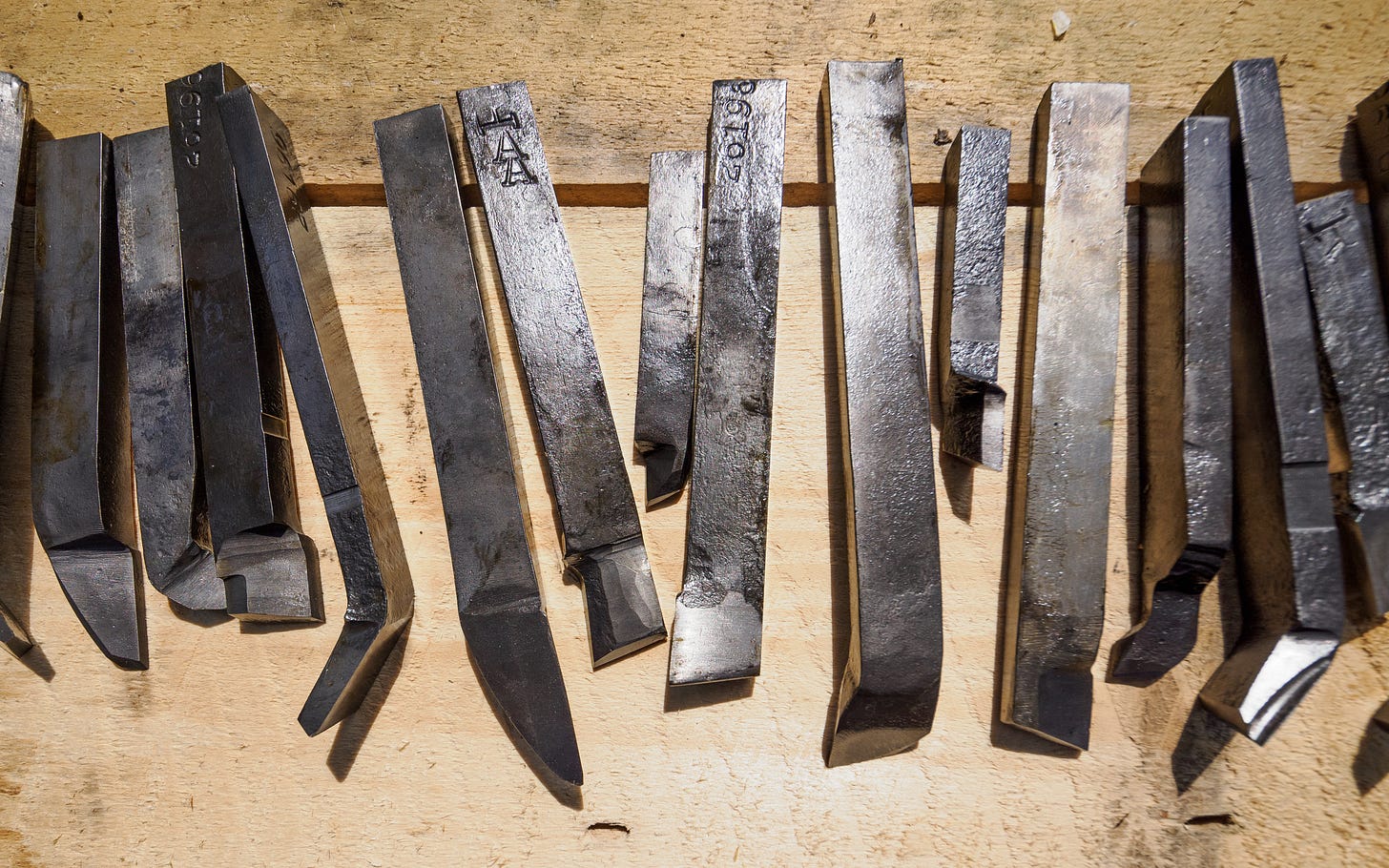Currier Machine Shop - Bank Village
These metal cutting tools were hand forged, heat treated and ground by Arthur L. Currier, Bill's Father' who operated a over-head belt drive machine shop in Bank Village from the 1920's until his death in 1951. These tools were used on machine tools such as shapers, planers and lathes to cut steel and other metals. Arthur held at least seventeen patents issued between 1911 and 1932, for many types of inventions. Some of his inventions were for: cutting buttons from shells or other materials, sewing closed multilayered paper bags (like cement bags), Trimming fiber phonograph needles, wiring closed mail bags, dressing grinding wheels, sewing buttons to cards, cutting lock key blanks, and sewing buttons to fabric. Arthur was also a meticulous draftsman, and always worked in a white shirt. Arthur could build wooden patterns for castings, and create any type of intricate machinery. Arthur's son Bill ran the machine shop in the 50's and 60's to service the ski tow and lift industry. Bill operated much of his father's machinery to create sheaves, pulleys and other mechanisms for the ski industry. Bill served on many town committees as selectman, firefighter and deputy forest fire warden. Albert William (Bill) Currier was born in 1918 and died in 2008. (John Rosenfelder Sep 2023)
Newspaper Clipping
2 Fliers Escape In Plane Crash At New Ipswich
May 25 1944
NEW IPSWICH, N.H., March 29- A pilot was injured and the front end of a cub super cruiser was demolished yesterday when the plane plowed through a snow fence on a local farm, crashed into a stone wall and overturned on the Jaffrey- to-Peterborough road here.
The crackup occurred before noon as Kenneth A. Ladd and Larome W. Brown, both of Westover field, Chicopee, Mass., attempted to make a landing on the 600-foot-long field at the Kenneth Gibbs farm. A high wind increased the air speed so that the plane overshot the tableland, according to the fliers. Eye witnesses claim the craft was traveling about 70 miles an hour prior to the crash.
Ladd was treated at the office of Dr. Clair G. Cayward for possible internal injuries and fractured jaw. The flier's front teeth were forced through his upper lip by the impact. He was released following treatment. Brown emerged uninjured from the overturned plane, the wreckage of which was to be hauled away today, Persons at the scene and those who aided in removing the plane from the road said it was in- credible that the fliers had escaped death.
Ladd and Brown came here to take back to Westover field a plane which had been forced to make an emergency landing at the Gibbs farm Saturday. This first craft left Claremont, N.H., and was reroute to Chicopee, Mass., when it became lost in a dense fog.
Spotting the open field, the two- passenger Piper cub, the property of E. W. Wiggins Airways, Inc., made a landing at the local farm. The wind was favorable as the cub approached the field from the north and was set down near Route 123. Police Chief Alfred Parhila then took the two unidentified fliers by auto to Westover field, after which they left by plane for Bermuda.
Ladd and Brown were sent to New Ipswich yesterday and the two planes were to be returned to their base at Westover field.
James Roger diary entries
13th September 1912
Fine day; wind variable east to west. David teaming rocks for Barrett. I picked 2 broilers, some peas and corn and went to mail; cleaned part of brooder house in afternoon.




I meant John Rosenfelder for the history. Also John Poltrack for posting it.
Been in that machine shop many times but was unaware of the genius of Bill's father. Thanks, Jon for that history.